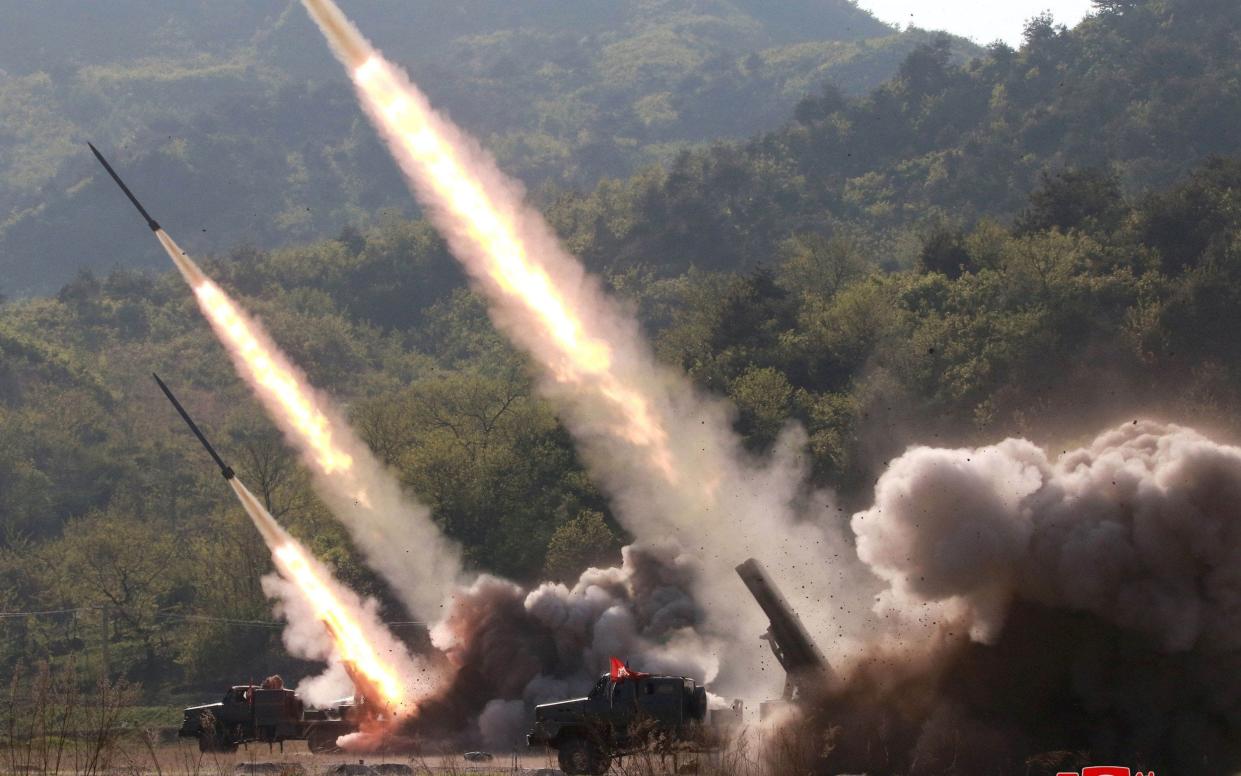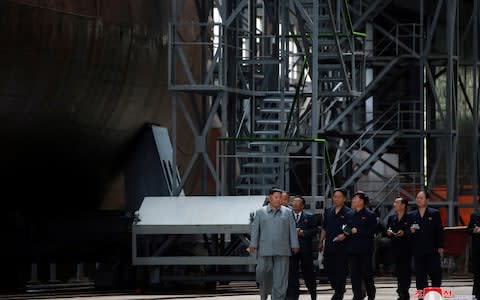North Korea tests 'new type' of missile amid rising anger over US military drills

North Korea fired two short-range missiles early on Thursday from its eastern coast, in a sign of its growing impatience with the lack of progress in talks with Washington over its nuclear weapons programme.
The missiles were tested from the coastal city of Wonsan, reaching an altitude of 30 miles. The second, a longer-range missile which flew 428 miles out to sea, appeared to be a new design but a detailed analysis is still being carried out.
The launch was the first weapons test since Donald Trump, the US president took a historic few steps into North Korea at its heavily armed border with the South in Panmunjom late last month. It indicates that the unprecedented gesture did not win much capital with Pyongyang.
At the time, the two leaders agreed to resume talks to disarm Kim Jong-un’s nuclear and missiles programme, which Mike Pompeo, the US secretary of state, said would likely begin in mid-July when the two sides had agreed their negotiating teams.
However, tensions escalated again last week when North Korea threatened to call off its suspension of its 20-month nuclear and missile tests, and the talks remain deadlocked.
The warning pre-empted a planned joint US-South Korea military exercise in August, which it called “a rehearsal of war, aimed at militarily occupying our Republic by surprise attack.”
For decades North Korea has campaigned to stop joint military drills between the US and South Korea and major military drills were called off after Mr Trump’s first meeting with Kim in Singapore last year.
However, smaller exercises, including August’s “19-2 Dong Maeng” are still taking place, sparking the latest missive from Pyongyang.
A foreign ministry statement said that Mr Trump had repeated a pledge to suspend the drills at the leaders’ short meeting on the border.
It added: “With the US unilaterally reneging on its commitments, we are gradually losing our justifications to follow through on the commitments we made,” stressing the military drill would also affect talks if it went ahead.
North Korea has shown increasing signs of dissatisfaction with the direction of its relations with the US and South Korea since a summit between Kim and President Trump in Hanoi in February ended in failure.

It also tested weapons in May, including both short-range missiles as well as smaller rockets. At the time, Kim oversaw the first flight of a previously untested weapon - a relatively small, fast missile experts believe will be easier to hide, launch and manoeuvre in flight.
Some analysts speculated that it could be the test of a KN-23, the short-range ballistic missile that was fired in May.
According to the James Martin Centre for Nonproliferation Studies, this missile can deliver a nuclear weapon-sized payload to targets throughout much of South Korea.
Vipin Narang, a securities professor at MIT, tweeted that “if it is KN-23, it isn’t long range and ROK (South Korea) can still call it a “quasi ballistic missile”, so Kim can go tit-for-tat with impending exercises while Trump and Moon live in denial.”
He added: “What it does show..is Trump’s trip to Panmunjom may not yet have had its desired effect.”
On Tuesday, North Korea’s state news agency KCNA reported Kim inspected a large, newly built submarine, accompanied by missile program leaders. It potentially signalled continued development of a submarine-launched ballistic missile (SLBM) programme.
South Korea’s defence ministry urged the North to stop acts that are unhelpful for easing tension, saying the latest test posed a military threat.
Japanese Prime Minister Shinzo Abe said the test has no immediate impact on Japan’s security.

